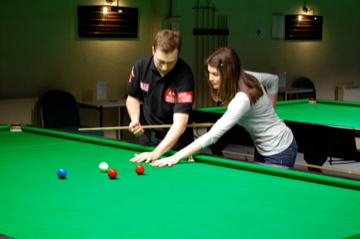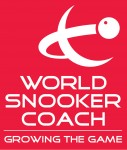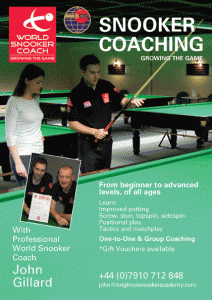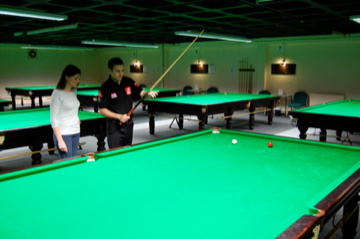About me
In a nutshell
Qualified as a World Snooker Coach in 2011.
Coach both in the UK (mainly from my home club in Brighton) and internationally (Hungary, Bulgaria, Czech Republic and Australia).
Highest match break: 142
Highest practice break: 147
The longer story
My first experience of potting balls was in a bar on holiday in Malta when I was seven years old. I played a couple of games with my older brother. I remember little about the games. The main thing I remember though was that the 1984 Los Angeles Olympics were on the TV and I found the whole sport-infused atmosphere thrilling. Three years later, on holiday in Ibiza, my brother and I found a way of rigging the pool table near to the swimming pool so that it released the balls without paying (nb I’m not condoning this behaviour!). We played over and over again but my brother (six years older and about three feet taller) beat me every time. I have a clear memory of the table and the balls and my excitement at clicking the table mechanism, releasing the balls for another game. But my snooker career did not begin until my twelth birthday and a party at a ten pin bowling alley. I was with four friends and my parents. Once inside I saw two English pool tables and felt a real gravitation toward them. Thankfully we had to wait for a lane to come free and so we played pool. I can remember the sensation of the balls going into the pocket. It is a feeling that is addictive to this day. I can never go too long without potting balls. After that I went back a couple more times and at home built a ‘snooker table’ out of wooden bricks, marbles for balls and my brother’s martial arts staff for a cue. A few months later my parents bought me a 6×3 table, which took pride of place in our front room. I remember my Dad and I spending an hour trying to work out how to screw the ball back.
I heard about a junior snooker club, which took place every Saturday and Sunday morning. An old billiard player ran the club and coached us the basics (he must have been about eighty years old). This is when I first started to think about technique and how to get better. I read Steve Davis’ ‘Successful Snooker’ and took in everything my coach had to say. His main focus was on smooth rhythmic cueing. ‘Ready, steady, go’ we would repeat as we cued. His focus was largely on safety and matchplay and not potting. He felt this was the way to win games, patiently waiting for an opening, potting easy balls and playing safe if an easy pot was unavailable and I trusted his judgement. This may have stilted my natural urge to just pot balls. I started to set myself goals, writing down on the calendar on my wall, breaks I wanted to get before a certain date. Over the next two years I hit 30, then 40, then 60 and then 77 in a league match, an hour after just having two teeth pulled out at the orthodontist! My ultimate goal was to make a century. This was my goal rather than winning particular championships. I think this was a competition I was having with myself, and it felt like the most important competition of all, perhaps too important. I always tried too hard and became overly anxious when getting near to a century break.
By 15 I was traveling around the country playing in junior competitions. A local business man and snooker enthusiast used to drive a group of us to these tournaments. There was a fantastic crop of junior players at the time like Paul Hunter, Matthew Stevens, Ronnie O’Sullivan and the competition was extremely tough; the junior competitions were more often than not tougher than the adult-inclusive competitions. I played three times a week and when there was too much school-work to be done, just twice a week. I couldn’t compete with these players on too little practice (at 14 I had gone to the church club 1 min away from my house. They turned me away saying I had to be 18 – I think this was the route to more table time I needed at this stage. I had to travel an hour on the bus to get to my snooker club.) Maybe I could have tried harder? Academically I was doing very well and I was achieving good grades at school through to college. At 18 a couple of the junior players who I’d traveled to competitions turned professional when the game went open in the mid-90s. I went to university and played very little snooker. After a year of hardly playing a strange thing happened. I came home from university for the summer. I hadn’t played for a few weeks and was desperate to go to my local club again and pot some balls. I was 19 and my highest break was something like 97. I had stopped counting by then. I didn’t make goals on my calendar anymore. I felt like a big under achiever and had stopped trying. I remember feeling so good about playing that first frame. I was just enjoying being in the club and on the table. In the second frame I potted a good long red and went on to clear the table with a break of 134! Another strange thing I remember is that I had a new pair of shoes, with a smooth sole. I found my mind quite focused on the sensation of sliding and gliding around the table with these new shoes. This may sound odd and it did to me at the time, but for that short period it gave me focus. But how could something that had nothing to do with the game of snooker, a pair of shoes, give me focus that helped me achieve a total clearance? This fascinated me. I felt great that I had achieved one of my main goals. The buzz was something I wanted to repeat again and again. I also felt it had been easy and wondered why it had been so difficult before. I always find this feeling after making a century break. Yet the next one is always so hard, something of a paradox. Again, fascinating to me.
I went back to university but played very little over the next three years whilst I completed my studies and traveled around the world. I did have some great times with the game whilst traveling, making an 80 break at a club four thousand feet up a mountain in Malaysia. A crowd had gathered around when the break was at 30, as they hadn’t seen many, if any breaks of this size, which was a lovely feeling. Sometimes a minor achievement can make you feel like a World Champion, if only for a fleeting moment.
When I returned from travelling I started to play in the local snooker league and local and regional competitions. It was a tough period for me because the cigarette smoke which seemed to create such thick clouds in every snooker hall started to affect the asthma I had always suffered from more and more. By the time of the smoking ban I was on the verge of giving up the game I loved. The ban gave me a real new lease of life and I not only started to play more and more once again but took the opportunity to re-evaluate my game, my technique and the way I practiced. I also came to realise that I was being held back alot by my own perceptions of my game and my ability – the weight of all those missed pots, heavy and close losses of the past. I realised if I wanted to improve my game it would be essential not to limit myself and bolt myself down to a standard of play I felt was ‘my level’. I needed to be an open book, open a fresh page. I read widely on sports psychology and methods used in other sports and disciplines. I looked further into the importance of natural instinct and allowing these instincts to make things happen rather than too much inhibitive conscious thought. One fantastic book was ‘Zen in the Art of Archery’ which I had heard Cliff Thorburn was reading at the time of his 147 break at the World Championships in 1983. If it’s good enough for the ‘Grinder’ then it’s good enough for me!
In 2011 I heard about World Snooker’s new venture to build up a team of coaches to help ‘grow the game’. I felt I had alot to offer other players and wanted to pass on my knowledge and experience to help others develop their games and enjoy the game as much as possible. I attended the first World Snooker coaching course under the guidance of former world champions Steve Davis and Terry Griffiths (big rivals in the 1987 World Final, a bit older, a bit wiser, inspirational). I’ve since coached players young and old, travelled – coaching in Bulgaria, Hungary, the Czech Republic and Australia. I’ve developed unique coaching techniques aimed at finding balance between conscious thoughts of technical development and natural instincts (the three phases, spectrum testing, zen cueing and more). I believe that finding this balance and allowing your instincts to analyse and inform your technique, your tempo, your rhythm as a player, is essential and forms my coaching philosophy. That, and having as much fun as you possibly can with the game!
I have the same enthusiasm as that seven year old boy playing pool on holiday in Malta. I think everyone who plays snooker is connected by the same thing – a compulsion to pot balls. That crisp sound of the snooker balls connecting and that addictive sound of the ball hitting the back of the pocket.





 Copyright © 2024
Copyright © 2024
Leave a Reply